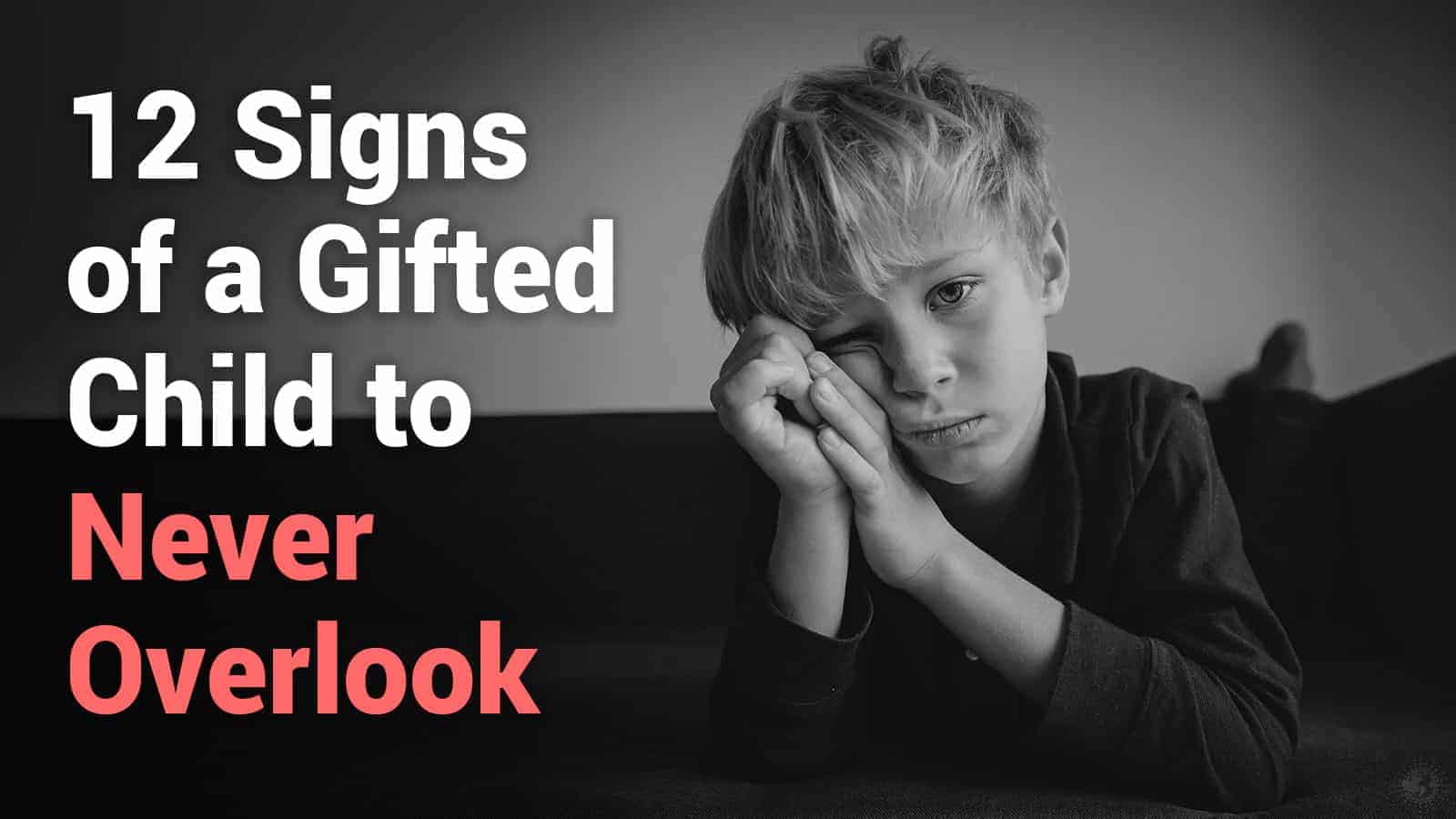A gifted child, by definition, has a higher level of intelligence and is advanced academically. They are often creative, artistic, and possess leadership skills. If you think your child is gifted, it’s essential to know how to help your child best.
Gifted kids act differently than other kids. But researchers suggest that parents and educators must view a child’s giftedness as their potential for growth rather than something they’ve already achieved. This information will help a child be motivated to learn and grow in their talents.
Gifted kids versus bright kids
People often confuse the terms bright and gifted. They have two different meanings. Bright children and gifted children are both smart. However, here are some fundamental differences between these two descriptions.
| Bright kids | Gifted kids |
| Like to work hard and do well in school. | Don’t need to work hard to do well in school. |
| Like to get the right answer to earn approval | Ask more questions, are curious, not looking or approval |
| Learn progressively, line upon line | Learn with some gaps, high in one area but low in another |
| Social development is correct for their age | Usually like to be adults or older kids more than their peers, may not respond correctly to social cues |
| Can handle scary movies or books for their age | Tend to be fearful, ask lots of questions, get scared easily |
| Like being at school | They’d rather learn by themselves |
| Can finish their work then do something else like read or draw | Very detailed, overly specific and interested in one minute point |
Here are twelve signs of a gifted child you should never overlook:
1 – Talk like a professor
Gifted kids’ language skills develop early. If you have a child who is gifted, he or she will have a large vocabulary for a child their age.
They’ll speak in more complex sentences and sound like a little professor when they talk to you. It’s easy to assume that a gifted child’s maturity level matches their language, but their minds get ahead of their physical and emotional growth.
They’re still a child with developing emotional needs. Don be intimidated or awed by your child’s intellect. Seek to provide them with a stable home environment where they can grow physically, emotionally, and intellectually.
2 – Read constantly
Gifted kids are voracious readers. They need to be told to stop reading at meals or bedtime. They read through their age level books so quickly. It can be quite challenging for parents and educators to find age-appropriate but exciting books for them.
A gifted child can quickly end up reading a fifth or sixth-grade book in kindergarten or first grade. The classic literature books are great reads for gifted kids.
3 – They’d rather hang out with adults
School can be challenging for these kids because they prefer adult conversations to talk with their peers. They find their peers’ non-intellectually stimulating. Adults tend to know more and have more experiences that gifted kids want to learn about.
It’s challenging for parents and educators to help them learn how to relate to their peers while allowing them time with adults for higher levels of conversation.
4 – Creative thinkers
Gifted kids are often creative and original thinkers.
Studies show there’s a connection between intelligence and creativity, but how they function together isn’t understood. They are inventive and often think outside the box when they play or do school work. Their creative energy can be hard to keep up with as a parent or teacher.
They may be obsessed with one particular type of creativity, like construction bricks, building elaborate structures that kids typically do not create. Wise parents will provide them books, materials, and the freedom to allow this outlet.
5 – Seem mature
Gifted kids like all kids develop physically, emotionally, and physically over some time. It’s easy to assume because a gifted child talks like an adult, they are adults. But gifted kids aren’t little adults.
They are still growing and maturing, sometimes at different rates in each area. They may be tiny for their age or very immature but seem older in the way they speak. It’s easy to put higher standards on how they should act because they’re gifted. Parents and educators must give a gifted child room to grow up and be a kid, even if they need intellectual stimulation.
6 – They are natural-born leaders
Gifted kids show leadership. They like to take charge because they’re full of ideas. They’re often intensely focused on their ideas. Other kids who want to follow will attach themselves to these kids because they like the excitement of being with the gifted kids. They get easily frustrated with themselves and others if people aren’t doing what they were asked to do.
7 – They might have a hard time socially
Researchers found that kids who have an IQ of 130 or more are more apt to have socio-emotional problems. These kids often have adjustment problems and behavior problems. Gifted kids prefer to hang out with adults. They may find it hard to play with their peers. They may be immature around kids. Gifted kids may want to take over the playtime with their creative ideas, making other kids feel like they’re being bossy.
8 – Precocious
Studies show that a child’s precociousness is a good indication they’re gifted. This precocious growth may be in intellect, music, understanding how things are related to the space around them, the ability to understand information physically through their hand and body movements. Precocious kids are typically advanced intellectually.
9 – Get bored at school
Studies show that schools often misunderstand the needs of gifted kids, making them sit through regular class instruction when they already know the information. The school may feel that a gifted child needs to learn to sit in a class with other kids so they’ll grow socially.
Although gifted kids do need to develop social skills, sitting through a slow-paced lesson isn’t the way to achieve this goal. A gifted child will often say that school is too easy for them, and this is misunderstood by an educator. Sadly, gifted children are often treated with irritation and alienation for being bored and unmotivated when their lessons are too easy.
10 – Like to talk
Some gifted kids are early talkers, while others don’t talk until they’re three or four. Whatever age they begin to speak, once they start talking, they don’t stop. Gifted kids have an incredible curiosity about things-how they work, why they work that way, and where they came from. If you have a gifted child, they will question you about everything, and you may find that you don’t the answers to their questions. That’s okay because you can teach them how to find the information they want to know in books, dictionaries, or appropriate online sites.
11 – Need little sleep
Gifted kids often have little sleep or time to reboot. This can be difficult for parents who try to get them to sleep longer. Typically gifted toddlers don’t nap as long as their peers and give up their naps earlier than other kids.
Parents will also note that their kids function well on less sleep. But some of their lack of sleep is that they can’t turn off their busy mind. They are thinking, questioning, and wondering all the time, so this interrupts their sleeping ability.
12 – A more advanced sense of humor
Gifted kids can crack jokes that even adults think are funny. They have a quick ability to see the funny side of things. This humor can sometimes be disarming to adults that a child is so quick to create a pun or an unusual side of something. They have a sense of humor above their peers who may be more literal and don’t understand abstract thinking as early.
Meet some famous gifted kids from history
- Albert Einstein: His teachers found him dull. He got kicked out of primary school because he couldn’t read fast enough.
- Mozart: He started playing the harpsichord at three years old and composed his first musical piece at age 5.
- Pablo Picasso: The first word he said was “pencil.” He painted his first famous oil painting at age nine years old.
- Blaise Pascal: He taught himself mathematic terms since his father refused to teach him these skills. Then at 12, he discovered on his own all the geometric proof of Euclid without a textbook.
- Clara Schumann: She didn’t talk until she was four years old. At the age of 7, she knew how to play the piano like a master. She started composing at ten years of age.
- Stevie Wonder: He was born blind to an impoverished family. He began singing and playing the organ and piano as a child. At 12 years of age, he recorded his first songs and performed them on stage.
- Marie Curie: As a gifted child, Marie Curie had a fantastic memory and incredible frankness even as a child. Once at the age of 4, she told one of her parents. Remember that time when I was three months old, and you put my diaper on backwards, idiot?
 Final Thoughts: Nurture the Emerging Abilities of Your Gifted Child
Final Thoughts: Nurture the Emerging Abilities of Your Gifted Child
Parenting a gifted child can be both a blessing and a unique challenge. You might find that your child outpaces his or her siblings and that their homework is over your head! Do all you can to continue to foster an environment that will allow your child to flourish and for these innate abilities to emerge.






















